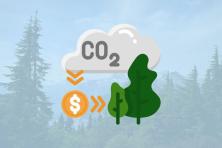In Support of Public Utility Commission Staff’s Analysis, Climate Advocates Call on Commissioners to Require the Major Gas Utility to Develop a Realistic Long-term Investment Plan to Meet State Climate Goals and Protect Vulnerable Utility Customers
Portland, Ore. — Utility customers should not be forced to shoulder the burden of risky investments in “natural” methane gas infrastructure in the face of a climate emergency. That’s the message today from eight climate and community-based organizations that submitted joint comments to the Oregon Public Utility Commission (PUC) in response to NW Natural’s Integrated Resource Plan (IRP).
“NW Natural does not have a realistic plan to meet Oregon’s state climate goals, so it is doubling down on painting a rosy picture of its future investments while simultaneously fighting climate policy at every level of government,” said Dr. Pat DeLaquil of Metro Climate Action Team. “We are gravely concerned that if the PUC were to acknowledge the millions of dollars in risky investments mapped out in NW Natural’s IRP, they will be putting ratepayers and the climate in jeopardy.”
Under state law, gas utilities are required to reduce carbon emissions to help mitigate the impacts of climate change on our communities. NW Natural – Oregon’s largest gas utility and one of the state’s largest fossil fuel corporations – has taken legal action to roll back this law. Meanwhile, as required by the PUC, the fossil fuel company has submitted an Integrated Resource Plan that lays out its intended investments for the next twenty years. If approved, NW Natural would have an easier path to charge its customers for these expenses.
The joint comments – which were submitted by The Green Energy Institute at Lewis & Clark Law School, Sierra Club, Natural Resources Defense Council, Climate Solutions, Columbia Riverkeeper, Community Energy Project, Metro Climate Action Team, and Electrify Now – focused on their support for recommendations made by staff at the PUC, with additional recommendations including not to approve NW Natural’s Forest Grove project.
In response to NW Natural’s Plan, PUC Staff raised concerns that the gas company did not properly assess risk, accurately estimate the costs of alternative fuels, or adequately consider alternative pathways to compliance such as strategically reducing demand and ramping up building electrification.
“NW Natural is proposing to saddle customers with millions in spending on risky hydrogen, synthetic gas, and biogas projects while continuing to build new fossil fuel infrastructure. Meanwhile, there are strategic efficiency and electrification solutions that could lower energy demand and customer bills today,” said Brian Stewart, Co-founder of Electrify Now.
In the short term, instead of ramping up the purchase of out-of-state biogas to comply with state-mandated reductions in climate pollution, advocates say that NW Natural should purchase Community Climate Investment (CCI) credits. CCI credits support projects that reduce climate pollution in Oregon's environmental justice communities. CCI credits can be invested in energy efficiency upgrades that cut pollution while lowering energy bills for households.
“NW Natural customers have already experienced a 42% rate hike over the past year and a half, and Oregon summers are predicted to get hotter and more dangerous in the coming years. We are gravely concerned that if the PUC were to approve the risky spending mapped out in NW Natural’s IRP, they will be putting customers and the climate further in jeopardy,” said Audrey Leonard, Staff Attorney at Columbia Riverkeeper.
Advocates also urged regulators not to approve NW Natural's proposed Forest Grove project, which would cost $3 to $7 million to expand the gas system in the city of Forest Grove. This is the first time NW Natural has formally presented the need for this project to the PUC and it claims that the costs are necessary to provide reliable service. But the company failed to investigate alternatives that could have more affordably reduced demand in the community without expanding the gas system and locking utility customers into 30+ years of paying off these investments.
“It is unacceptable that NW Natural not only failed to investigate alternatives to investing in new infrastructure for its system in Forest Grove – alternatives that could have helped its customers save money in the short and long term – but also that it waited to flag these reliability issues for the PUC until now,” said Carra Sahler, Interim Director and Staff Attorney at the Green Energy Institute at Lewis & Clark Law School, “This is exactly the kind of irresponsible expense that should be borne by the company’s investors, not customers, especially while energy bills continue to rise.”
Oregon regulators are expected to formally approve or reject NW Natural’s IRP in early June.
##





